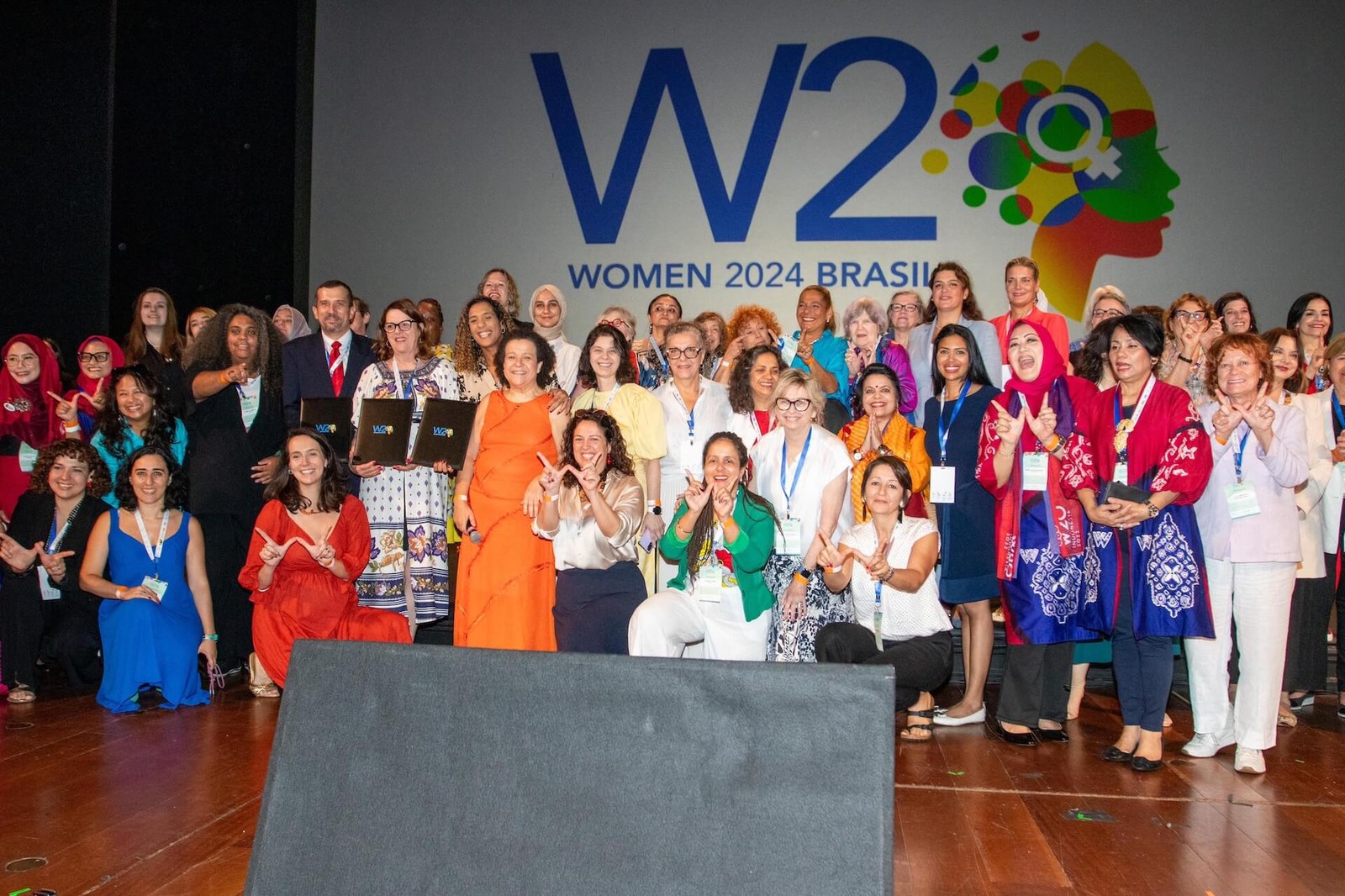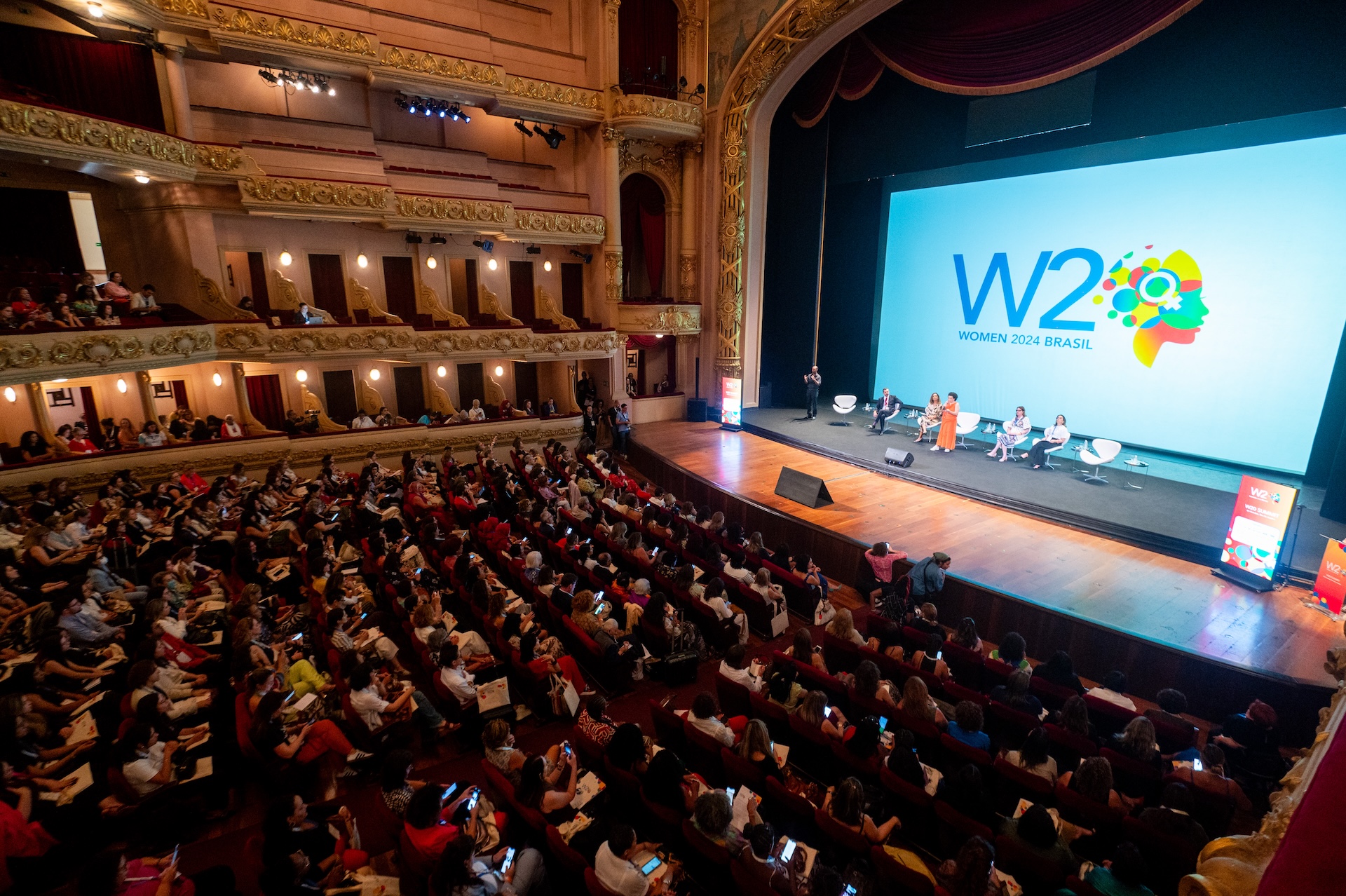W20 submits Communiqué to G20 with a global call for economic empowerment of women and fighting against gender-based violence
Focusing on actions coordinated by the G20 countries, the W20 presented its "Communiqué" in Rio de Janeiro, highlighting five priority thematic axes: gender equity, economic empowerment of women, inclusion in STEM (Science, Technology, Engineering, and Mathematics), gender-sensitive climate justice and fight against gender-based violence.

The 2024 "Communiqué" by the engagement group, Women 20 (W20) was delivered on Tuesday, October 1st, in Rio de Janeiro. The document was presented at an in-person event at the Municipal Theater (Teatro Municipal), with the participation of international organizations. W20 is a G20 engagement group focused on promoting gender equity and women's economic empowerment.
The Communiqué highlights five central axes as priorities for G20 leaders to promote practical actions. The document concludes that promoting gender equality is essential for sustainable economic growth and strengthening the resilience of the G20 countries. The economic empowerment of women, the fight against gender-based violence, the inclusion of women in STEM, and the integration of a gender-based approach in climate policies are the pillars that should guide global efforts.
The five topics addressed are priorities of W20, which calls on leaders to act in a coordinated manner to implement actions and ensure that future generations grow up in a more just and equitable world for women and men.
Regarding female entrepreneurship, the text addresses access to financing, money, and markets. W20 recognizes the essential role of female entrepreneurship in promoting a more robust, innovative, and equitable economy. Regarding female entrepreneurship, the document estimates that gender equity could increase global GDP by up to 6%, representing an increase of 5 trillion dollars to the world economy. However, women need more access to finance and capital for this potential to be achieved.
The W20 proposes that G20 countries implement policies to increase the availability of credit and market opportunities for women entrepreneurs, regardless of their businesses' stage of growth. The recommendations include creating financial instruments that engage commercial banks, public and multilateral institutions, investors, and financial technology (FinTech) companies. The need to include financial and digital education in programs aimed at women was also highlighted, in addition to facilitating women's participation in national and international markets through gender-sensitive public purchasing policies.
The document also calls for tax incentives for investors who support women entrepreneurs, such as tax deductions, credits, and government contributions.

The Care Economy represents 11 trillion dollars in added value
The economy of care was also placed as a strategic priority for promoting gender equality. W20 highlights that comprehensive and high-quality care systems are essential for job creation, increased productivity, and poverty reduction. According to the document, the care economy represents 9% of global GDP and, when unpaid work is included, adds an estimated 11 trillion dollars in value.
At this point, G20 leaders are called upon to prioritize the equal redistribution of unpaid care work, which falls disproportionately on women, and ensure universal access to care services for children, older people, and people living with disabilities. The W20 also highlights the need to collect and share sex-disaggregated data on unpaid care work to develop public policies that value and reward care work, ensuring decent employment and social protection for caregivers.
Public investments in assistance services, infrastructure, and technological innovation are seen as fundamental to increasing women's participation in the labor market and promoting gender equality.
From the perspective of STEM (Science, Technology, Engineering, and Mathematics), the W20 recognizes that there is a gender gap, particularly in areas such as Information and Communication Technology (ICT) and Artificial Intelligence (AI), and that is one of the main obstacles faced by inclusive economic growth and social equity. Only 35% of global enrolment in higher education courses in STEM are women, which limits the use of their economic potential and their participation in strategic areas for the future of work.
To address this challenge, W20 proposes that the G20 invest in developing inclusive digital tools and public services to reduce inequalities. Specific actions include creating lifelong learning opportunities for women of all ages and providing scholarships, especially for disadvantaged groups. The goal is to increase women's participation in science and technology sectors and ensure that women, including those from underrepresented communities, hold leadership positions in these areas.
In addition, the statement calls for AI to be developed equitably, with funding directed toward research that ensures emerging technologies benefit everyone, including women and girls.
The W20 also makes a strong call for a gender-sensitive climate justice approach, considering that women, particularly in contexts of poverty and vulnerability, are the most affected by environmental disasters. According to the statement, women and girls represent 80% of the victims of climate disasters, which often leaves them more exposed to situations of poverty, violence, and social exclusion.
As the G20 countries are responsible for 75% of global greenhouse gas emissions, the document highlights the importance of integrating a gender perspective into all climate change mitigation and adaptation strategies. Recommendations include implementing gender-just climate finance and directly supporting women-led projects, especially those aimed at adaptation and resilience in communities that depend on natural resources.
Another point emphasized was the importance of training more women in disaster response mechanisms and placing them in leadership roles to ensure that climate actions include an equitable approach.
During her participation in W20, Ana Fontes, president of the engagement group, pointed out how climate emergencies disproportionately affect women and girls, emphasizing the importance of integrating the gender perspective into the policies of the G20 countries. "When we talk about climate justice from the gender perspective, we deal with the fact that inequalities affect women more severely," she said. She exemplified the situation of floods in Rio Grande do Sul, where women were the most affected, having to take care of the children, in addition to suffering violence in shelters.
Ana also mentioned that issues such as basic sanitation and lack of water affect women the most, who are often responsible for seeking water in regions of drought. “That’s why W20 called for gender to be a central part of the climate justice debates at the G20,” she affirmed. She concluded that there is a need for inclusive governance in the G20, with greater female representation. "The G20 summit is predominantly male. Women make up 52% of the population and need to have their voices heard," she argued.
Tackling violence against women and girls is highlighted as a fifth axis and as an urgent priority, with the W20 demanding that G20 countries adopt strict measures to end all forms of violence against women and girls. Approximately 1 in 3 women in the world have experienced physical or sexual violence at some point in their lives, which results not only in severe emotional and health consequences but also in economic losses. The economic impact of gender-based violence is estimated at 3.7% of global GDP due to costs associated with health care, lawsuits, and loss of productivity.
Among the measures recommended in this area are the development of policies and legislation that guarantee the protection of women, the prevention of femicides, and the fight against technology-facilitated violence. Furthermore, W20 calls for increased investment in educational programs that address harmful social norms and promote gender equality from childhood, as well as the systematic collection of national data on femicide and gender-based violence so that more effective public policies can be developed.
Regarding the W20's role in the fight against gender-based violence and the promotion of empowerment of women, the executive secretary of the Ministry of Women, Maria Helena Guarezi, emphasized the relevance of women's participation in the economic and global governance process. According to the minister, the W20 has been a vital instrument in boosting the debate on women's empowerment, focusing on essential topics such as economic autonomy, gender-based violence, and the consequences of the climate crisis. “We hope that all the energy we put into this year’s work will translate into concrete results,” she said.
Guarezi also mentioned President Luiz Inácio Lula da Silva's approach, prioritizing core issues such as global governance, fighting hunger, poverty, and climate change. For her, this line of action strengthened civil society's engagement in the G20 debates, making the W20 even more relevant. "This year, the W20 was strengthened, and we thank everyone who contributed voluntarily to this great coordinated effort," she said.
Communiqué delivered to authorities
The W20 Communiqué, the result of the work of 130 delegates from 19 countries and two economic blocs that are part of the G20, was submitted to Brazilian authorities, including the Minister of Racial Equality, Anielle Franco, and Ambassador Felipe Hees, Sous-Sherpa of the G20 Brasil at the Ministry of Foreign Affairs. He emphasized the importance of government and civil society collaboration during the W20 International Summit. Hees stressed that this intense collaboration throughout the year is a source of pride for Brasil's government, which has promoted direct dialogue between the parties. "In recent years, civil society has been concerned that government and civil society have not always been aligned at the G20. The agendas that we have ahead demand collective action," he said.
The ambassador also emphasized the importance of the W20 final communiqué, describing it as the high point of these contributions. "The expectation is that we can retain as much of these contributions as possible in the leaders' statement," he said. However, he recognized the challenge of reconciling the different views of the member countries. Still, he reinforced the importance of finding a balance that reflects the centrality of the theme of gender equality.
Hees was categorical in summarizing the importance of civil society participation: "There is no government in a vacuum. If governments are unable to engage and dialog with civil society, common challenges won't be overcome," he stated.
Created in 2014 during Australia's presidency, the W20 seeks to recommend policies and commitments for G20 leaders to adopt. Brasil has been part of W20 since 2017.
Translated by PGET-UFSC